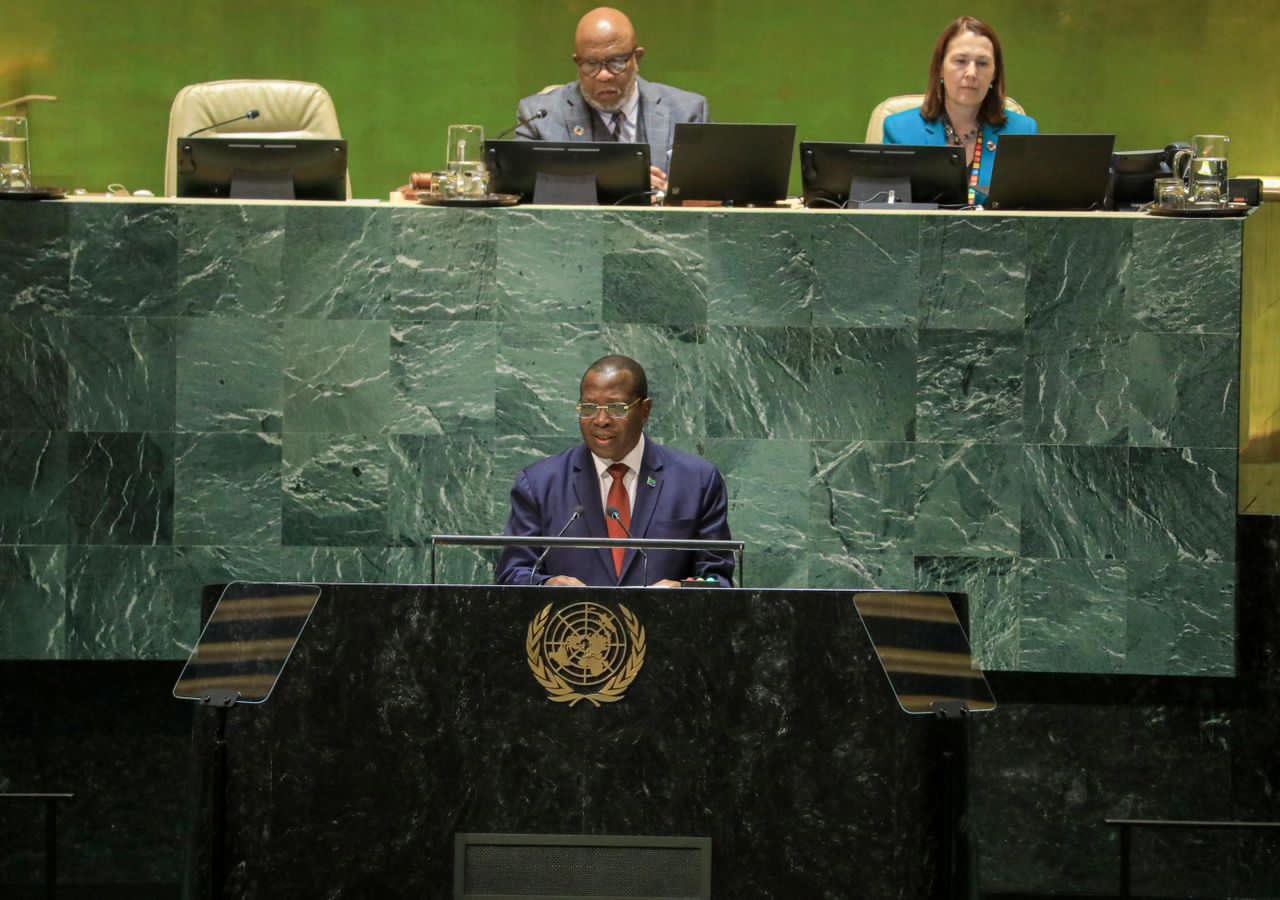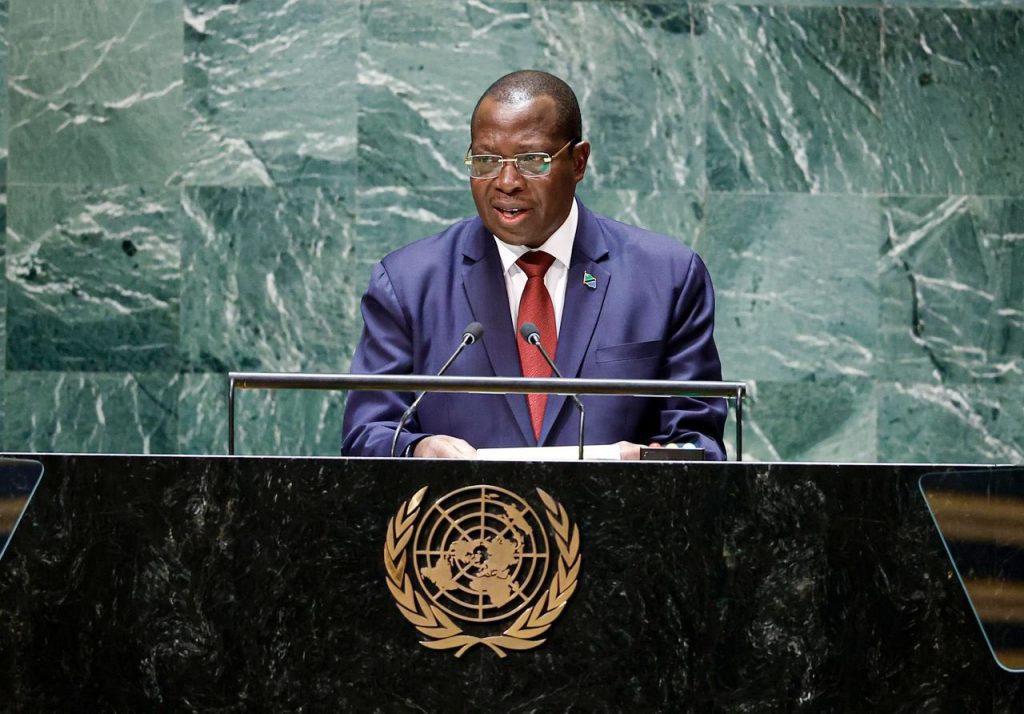On September 21, 2023, a significant event took place. Leaders worldwide gathered for the United Nations General Assembly’s 78th Session (UNGA 78th Session). Among them was Tanzania’s Vice President, Dr. Philip Mpango. He stood as the voice of Tanzania, sharing his country’s perspectives and aspirations on a global stage.
Dr. Mpango’s speech touched on important topics that concern not just Tanzania but the whole world. He talked about the need for global peace, saying that achieving other goals would be hard without peace. He stressed that nations should work together instead of fighting to create a better future for everyone.
He also talked about the Sustainable Development Goals (SDGs). These are a set of goals set by the United Nations to make the world a better place by 2030. Dr. Mpango shared that the journey so far has been slow, and more needs to be done. He urged countries to invest more in their people to speed up progress.
Lastly, he discussed climate change. He said that climate change is a big threat to the world and talked about recent natural disasters as examples of its dangerous effects. Dr. Mpango called on all nations to take urgent action to reduce greenhouse gas emissions. He emphasized that tackling climate change is crucial for Africa and the world, and he advocated for a fair transition to clean energy to help combat this global challenge.
In his speech, Dr. Philip Mpango painted a picture of a united global community working together to overcome the challenges that lie ahead. Through peaceful relations, committed action on sustainable development, and urgent measures against climate change, he envisioned a path toward a better, safer, and more prosperous world for all.
Our Analysis on Global Peace and Combating Terrorism
Dr. Mpango’s emphasis on peace as a crucial prerequisite to development is a stance that reflects a deeper understanding of global dynamics. He articulates that without peace, the promises of a better world and opportunities for all, especially the vulnerable populations, would remain unfulfilled. The Vice President’s statement, “Peace is undeniably a prerequisite for achieving the 2030 Agenda for Sustainable Development,” manifests Tanzania’s recognition of peace as a fundamental building block towards realizing broader socio-economic goals. His address echoes a core principle that development and peace are intertwined, and one cannot thrive without the other.
Dr. Mpango’s acknowledgment of the United Nations’ efforts in maintaining global peace and security shows Tanzania’s alignment with multilateral approaches to resolving conflicts. He particularly lauds the Secretary-General’s New Agenda for Peace, viewing it as a visionary roadmap for collaborative endeavors towards global tranquility. His statement, “Tanzania highly commends the United Nations, for its tireless efforts in maintaining international peace and security,” indicates a strong endorsement for the UN’s role in fostering a peaceful international environment. Furthermore, his call for the Assembly to consider the priorities stipulated in the new peace agenda underscores a desire for collective action in upholding international law and order.
The Vice President’s speech portrays Tanzania as an active participant in promoting global peace. By stating that Tanzania stands as the 12th largest contributor among 125 countries in UN peacekeeping missions, Dr. Mpango underscores his country’s commitment to peacekeeping efforts. He amplifies Tanzania’s readiness in saying, “Tanzania remains fully committed and ready to work with the UN family in maintaining global peace and security…” His assertion reflects a proactive stance in not only supporting peace on the global stage but also taking a hands-on role in peacekeeping missions.
Furthermore, Dr. Mpango’s call for increased support to regional initiatives aimed at bringing peace to conflict-torn areas in Africa demonstrates a forward-thinking approach to addressing the root causes of instability. By condemning those fueling conflicts for personal gains and urging the international community to work together in combating terrorism, he presents a holistic and collaborative outlook towards achieving enduring peace and security. His narrative reaffirms Tanzania’s dedication to fostering peace and combating terrorism both within its borders and beyond, aligning with broader international efforts to create a safer world for future generations.

Insights on Sustainable Development Goals (SDGs) Implementation
Dr. Mpango casts a spotlight on the dire need for accelerating progress towards the 2030 Agenda. He shares a sobering reality, expressing disappointment at the collective underperformance on the SDGs, as a mere 15% of the 140 targets are on track. He quotes, “It is discouraging to note that at half time, we are off-track to meet most of the Goals.” This statement encapsulates a global concern and serves as a wake-up call for nations to reignite their commitment towards achieving the SDGs. His critical assessment is a candid reflection on the shared responsibility and the necessity for bolstered efforts to meet the goals.
In his address, Dr. Philip Mpango articulates Tanzania’s pledge towards implementing the SDGs, substantiated by its Voluntary National Report. He provides evidence of significant strides made in certain goals, noting improvements in food sufficiency, health, education, gender equality, water supply, and electrification. The quote, “Tanzania is fully committed to implement the SDGs as envisaged…there has been significant progress with respect to SDGs 2 – 7,” portrays a narrative of progress and commitment. However, he also acknowledges moderate performance on some goals, reflecting a balanced and honest evaluation of Tanzania’s SDG journey.
Dr. Mpango emphasizes the importance of investing in people and fostering partnerships as a linchpin for accelerating SDG implementation. His call for a “supercharged implementation and partnership especially prioritizing to scale up investment in people,” resonates with the fundamental tenets of the SDGs which are rooted in inclusivity and collaborative action. He delineates Tanzania’s strategies like enhancing domestic revenue efforts, capitalizing on public-private partnerships, and investing in social service sectors as pathways towards accelerating the realization of the SDGs. This segment of his speech underscores the crucial role of human capital and partnerships in fast-tracking the achievement of the 2030 Agenda, aligning with a broader global sentiment of leaving no one behind.
Deliberations on Climate Change from Dr. Philip Mpango
Dr. Mpango doesn’t mince words when he labels climate change as the world’s greatest threat, a sentiment echoed by many global leaders and scientists. He references recent natural disasters to paint a vivid picture of the catastrophic impacts of climate change, stating, “Recent natural calamities… amplify the horrible effects of climate change.” His articulation serves as a clarion call to the global community to recognize the gravity of the threat posed by climate change, not just to the environment but to humanity at large. His passion can be influenced by the fact that back home, his office handles everything Climate Change related.
Dr. Mpango emphasizes the urgency for collective action to mitigate greenhouse gas emissions and strengthen adaptation measures. His words, “Together, we must create an enabling environment and facilitate investments needed to unlock resources for scaling-up implementation of our climate commitments and decarbonisation of the global economy,” bespeak a global endeavor transcending national boundaries. He not only acknowledges the problem but also steers the discourse towards actionable solutions that require global cooperation.
Read Climate Change: Why Tanzania Plays Hard, Pays Hard, and Should Care Less.
In his address, Dr. Mpango champions a fair and just clean energy transition for Africa, a region often at the sharp end of climate change impacts despite its minimal contributions to global emissions. His phrase, “Tanzania also reiterates its call for a fair and just clean energy transition for Africa,” underscores a plea for equity and justice in the global climate action discourse. His advocacy sheds light on the broader narrative of climate justice, ensuring that the transition to clean energy does not perpetuate existing inequalities but rather, fosters an equitable sharing of benefits and burdens. Dr. Mpango’s discourse encapsulates a region-wide aspiration for a clean energy transition that is both fair and just, mirroring a larger global debate on climate equity.
Critique on Unilateral Coercive Measures
Vice President Dr. Philip Mpango makes a strong stance against unilateral coercive measures, portraying them as detrimental to economies and, more importantly, innocent lives. His statement, “Unilateral coercive measures have serious adverse effects on the targeted economies and innocent lives especially of women and children, the very people we have committed not to leave behind,” mirrors Tanzania’s advocacy for a more inclusive and just global order. This opposition to unilateral sanctions aligns with a broader dialogue on the importance of multilateralism and collective decision-making in the global arena to ensure fairness and equity.
Dr. Mpango extends Tanzania’s call for justice to the global stage, advocating for the peaceful resolution of territorial disputes and the end of occupations or dominations. His call for the “lifting of unjust sanctions and an end to occupation or subjugation,” represents a plea for adherence to the principles of the United Nations Charter, which prioritizes peaceful co-existence and resolution of conflicts through dialogue and mutual respect. This portion of his speech reflects a deeper commitment to fostering global peace and justice, underlining the essence of unity and mutual understanding in resolving longstanding geopolitical disputes. His message resonates with a universal aspiration for a world devoid of conflict and oppression, urging nations to act in accordance with the principles of justice and international law.
Dr. Mpango’s Overarching Message and Tanzania’s Vision for a United Global Community.
Dr. Philip Mpango, in his address to the United Nations General Assembly, encapsulated a vision of a harmonious global community anchored on peace, sustainable development, and an urgent and collective action against climate change. His articulate delivery painted a picture of a world where nations transcend conflicts, embrace the tenets of the Sustainable Development Goals (SDGs), and unite in the face of the escalating climate crisis. Tanzania’s Vice President emphasized the intertwined nature of these global challenges and the necessity of a shared responsibility in overcoming them. The thematic core of his discourse – global peace, climate action, and a collective stride towards the 2030 Agenda, reflects a holistic approach to global issues, underscoring Tanzania’s aspirations for a better, inclusive, and sustainable world.
The speech by Vice President Dr. Philip Mpango at the 78th UNGA session resonates on a global scale as it echoes the broader concerns and shared objectives of the international community. His emphasis on peaceful resolutions, equitable development, and a concerted response to climate change are subjects of universal significance. The Vice President’s articulate narrative not only elevates Tanzania’s stance on these critical issues but also contributes to the ongoing global dialogue aimed at fostering unity, equity, and sustainability. Moreover, his endorsement of multilateral efforts underscores the essential role of international cooperation and adherence to the principles enshrined in the United Nations Charter. The reflections and propositions made by Dr. Mpango add to the broader discourse, urging nations to transcend individual interests and work collectively towards resolving the pressing challenges of our time. His address signifies a call to action that is not only timely but also embodies the spirit of global solidarity necessary for forging a prosperous and peaceful future for all.

